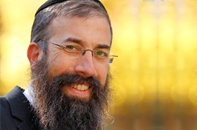 A Word From The Rabbi
A Word From The Rabbi
Dear Friend,
This weekend I joined over 4,500 Rabbis from across the globe in Brooklyn, NY at Lubavitch World Headquarters for our annual international convention. It is so very encouraging and heartwarming to spend the weekend with colleagues from around the globe - it's like a family reunion. It is also a weekend of gaining renewed strength and energy to continue the mission the Lubavitcher Rebbe has empowered us to do.
In addition to the convention for the Shluchim, close to 600 children of Shluchim including my own son, Shneur, participated in their own convention this weekend. For many of these young selfless children it's a very rare and prized opportunity to mingle and socialize with children just like them before they return home where they resume the role of "the Rabbi's son", assisting their parents in embracing and servicing the Jewish people of their communities.
To learn more about this unique, invigorating convention, click here.
I encourage you to read a special article on our website, entitled "The Emissary" about the Rebbe's vision to change the world... it is fascinating!
On to the weekly potion:
In this week's Torah portion, Toldot, we read of how Isaac wanted to bless Esau but was prevented from doing so by Rebecca, his wife. It was through her intervention that the blessings were bestowed upon Jacob instead.
A fundamental question is raised by this incident. How could Isaac have possibly preferred Esau over Jacob? True, our Sages tell us that Esau repeatedly tried to deceive his elderly father into thinking he was G‑d-fearing and observant, by pointedly asking questions about religious law, but it is still hard to imagine Isaac being fooled by Esau's ruse. In fact, when Jacob presented himself to receive his father's blessings, Isaac declared that "the voice is the voice of Jacob, but the hands are the hands of Esau." Isaac recognized how unusual it was for Esau to address him in such a civil manner or even to bring G‑d's name into the conversation. Isaac surely realized that something was amiss. But if Isaac was well aware of Esau's serious shortcomings, why did he nevertheless want to give the blessings only to him?
The truth is that Esau, the firstborn twin, possessed an extremely lofty soul capable of incredible spiritual accomplishments. In certain respects, Esau was on an even higher spiritual level than his brother Jacob. Jacob was born to be a "dweller in tents (of Torah)," protected from the outside world, enclosed within the four walls of the yeshiva. Esau, however, was "a man of the field," blessed with the spiritual strength to venture forth into the coarser material world to wage war against evil and impurity, bringing G‑dliness and holiness down into the physical realm. It was Esau, therefore, who possessed the greater spiritual might.
This, then, explains Isaac's desire to bless Esau, despite his knowledge that his son was abusing these spiritual gifts: Isaac hoped his blessings would cause Esau's considerable talents to be brought out and revealed. Not only would Esau repent of his evil ways, but the entire world would benefit from his actions.
G‑d, however, knew it was too late for Esau to repent and live up to his potential. Instead, the blessings were given to Jacob, and with them, the power to overcome evil and transform it into good, and to illuminate the world with the light of Torah.
Wishing you a successful and productive week,

Rabbi Yudy Shemtov
Senior Rabbi/Executive Director

